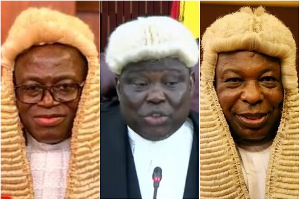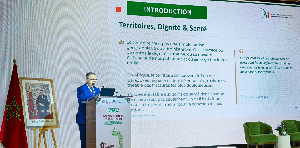The famous philosopher Aristotle made a very profound statement in the fourth century BC that, “man, by nature, is a political animal.” It is, therefore, not surprising to find in our contemporary times people who literally ‘eat’, ‘sleep’, ‘wear’ and ‘drink’ politics on a daily basis. Politics is about decisions and choices, and it will be extremely hypocritical for anyone to pretend not to be indulging in politics. You know what; even your decision to remain apolitical is political in itself!
So I concede that my decision to pick on this subject is political, and even the kind of meaning you derive from this piece is also political. Therefore, I have no qualms about people openly professing their love for a particular political party; be they a group of musicians, students, farmers or even footballers. However, I find it politically incorrect and unacceptable for a group of lecturers of the Kwame Nkrumah University of Science and Technology (KNUST) to OPENLY declare their support and vow to campaign for the NPP in the 2016 elections. While it is their constitutional right to join or campaign for any political party of their choice, just as all other Ghanaians, the kind of service they render to the state, in my arrogant view, puts some obligation on them not to openly declare support for one political party or the other.
As a student of politics, I know that civil servants and, indeed, public servants are supposed to be politically neutral. This political neutrality does not in any way preclude them from voting for political parties of their choice or campaigning for their favourite political parties. But what it does is to place some obligation on them to exercise political neutrality in the performance of their public duties, so long as they continue to draw their salaries and emoluments from the Consolidated Fund. I think, therefore, that lecturers of a public university should not declare support for a political party, no matter how well-intentioned or malignant that decision may be.
There is no gainsaying that Ghana is extremely polarised; if not sharply divided along political party lines. It is interesting how some people have perfected the art of attributing every good omen or a misfortune to one political party or the other. I recently chanced upon two gentlemen who were arguing strongly over a lost phone. While one was blaming the current administration for making him lose his phone, the other was recounting the several tales of misfortune which had befallen him under the previous administration. Political equalisation and ‘blame game’ seem to have permeated every facet of a Ghanaian’s life!
So, in my considered opinion, the last thing Ghana needs in its current state is public servants openly declaring support for one political party or the other to further deepen the cracks in our national unity efforts. What if other essential public service providers also decide to follow the example of this group of lecturers? I don’t think our democracy has the needed ‘shock absorbers’ to withstand the potential havoc this could wreck our dear nation.
Yes, lecturers are Ghanaians and have an equal stake in how or what they perceive to be the ideal way the country should be governed. They are knowledgeable and can make significant contributions to lifting the country from its current economic doldrums; but they certainly need not mount campaign platforms to make their contributions count. They can always pool ideas and resources to come up with workable solutions and viable alternatives for the attention of government and policy-makers to address the country’s problems.
The argument that some of these lecturers have been serving as patrons of political party groupings on campus, and so can form their own group to advance the cause of a political party lacks merit. For crying out loud; students form the membership of these political party groupings and students do not occupy any public office! But these lecturers occupy public office and they cannot use their public office, as lecturers, to campaign for a political party.
Again, I ask, have these lecturers thought about the repercussions of their action in the likely or unlikely (depending on which side of the political divide you belong) event that their preferred candidate does not win the elections? These lecturers would have succeeded in pitching a public university against a sitting government and could, in a worst case scenario, even trickle down to affect the students.
Nobody is saying these lecturers cannot, in their individual capacities, support political parties of their choice, but it is both legally and morally wrong for them to team up and do so while they remain public officers. The best option for them is to resign en masse from the public office they hold and join their preferred political parties and candidates on the campaign platform!
By: Richard Amoako Ansong
Email: aasirrichard@yahoo.com
Blog: aasirrichard.wordpress.com
(The writer is a public relations and communications professional)
Opinions of Saturday, 25 April 2015
Columnist: Ansong, Richard Amoako














